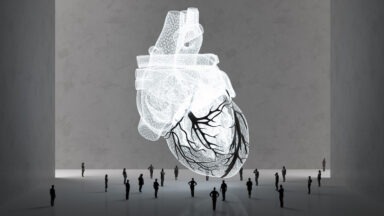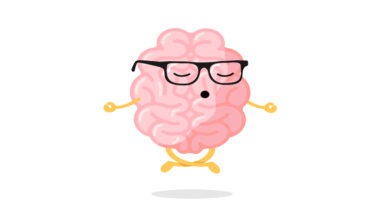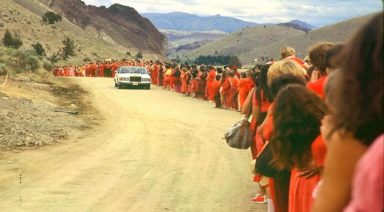Research Shows Gratitude Practices Lower Inflammation

Researchers have uncovered the potential of a daily gratitude practice to heal the body and mind.
While research in the field of positive psychology has shown the clear benefits of positive attributes such as compassion and empathy, new studies suggest that gratitude may have the biggest effect of all.
Dr. Paul Mills has been studying the effects of gratitude as a professor at the University of California San Diego and as Director of Research at the Chopra Foundation.
“The way I define gratitude is, it’s a way of seeing the world with a sense of heartfulness; a sense of embracing-ness; a sense of appreciation for all that is being experienced. Typically people differentiate gratitude from thankfulness — it’s a response in exchange for something. Gratitude really, at its foundation, it’s more of a dispositional set where we walk around with gratitude for everything that’s going, just really the gift of life.”
Over the last several years, scientific studies into the psychological and physiological benefits of gratitude have grown exponentially.
“I think one of the main reasons that research on gratitude has taken off more than other areas that we typically could call positive psychology, is because the findings, the significance, in all the studies is so high and impactful. So many of the studies that have been looking at gratitude find more and more significant effects related to health and wellbeing.”
Some of the more recent studies on gratitude have focused on the physiological benefits to the heart.
“I’ve done a lot of research, with cardiac patients for example, and it was quite significant what we’ve been able to show that those patients who have more of a state of dispositional gratitude and sometimes it’s called ‘carrying around an attitude of gratitude,’ where we feel grateful for pretty much anything and everything going on — despite what it might be to other people’s eyes — that has a profound effect on these patients, they sleep better (and) they have more energy. And we found that those patients who had been doing gratitude journaling had a significant reduction in inflammatory markers in the blood. It was approximately a 23 percent reduction in five different biomarkers of reduction over a two-month period. This is a striking and amazing finding. You would never anticipate anything like that even with medication.”
Other recent studies have shown the important role gratitude plays in mental health.
“When we were studying people who have what’s called ‘Persistent Mental Disorder’ and specifically it was through their recovery process of getting better when they have a kind of acute breakdown. This included people who have depression, major anxiety, bipolar disorder, and schizophrenia, and what we found is that gratitude as well as compassion, as well as a sense of connectedness in the world, very much supported their recovery through this process of getting over their disease and getting back to a stable state.”
Just how does gratitude exert this powerful effect?
“It provides for us a sense of connection with not only ourselves but the world around us. And when we have more of a sense of connection, we feel more at home, we feel less stressed, we feel less depressed. There have been several EEG studies looking at the frequencies of the brainwaves, and there have been some fMRI studies looking at the structure of the brain — just the functional activity of the brain — and it’s very interesting, these studies have been showing, again and again, there are differences. So, gratitude does change the behavior and activity of parts of our brain, and structurally there’s evidence for that too.”
Mills suggests gratitude journaling as a great way to build a regular practice.
“The easiest route would be (to) buy yourself a journal and begin to spend some time every day just writing down things you’re grateful for. Overtime maybe you don’t get to your journal, but maybe just stop and reflect, and have that in your mind, ‘[W]hat am I grateful for?’ That will begin to change your life, I’m convinced of it. The evidence has again and again been shown, and in my own life it’s been very transformative.”
How to Connect With the Divine Energy Your Higher Self Holds

Connecting with the Divine Energy within your Higher Self can be a transformative and enlightening experience. It can guide you toward a deeper understanding of your true nature and spiritual potential. To embark on this journey of self-discovery, you’ll need to do a couple of things that seem easy but might be harder than you think in practice. From finding a quiet and peaceful space to silencing your mind and communicating with the divine, it requires more than simple meditation. Divine Energy pervades all of existence. Embrace this connection with an open heart, and let it illuminate your path toward spiritual growth and self-awareness.
What is the Higher Self?
The Higher Self, also known as the Divine Self, is the Self that exists at an even higher level than the soul; it is in every human being ever born. It is the true self essence of the Universe that dwells in your being, the source of all light and life within you, and your true motivation for living. It is a belief held by Hindus and New Age thought alike.
The Divine Self is what powers you and makes you wonder. It is the spiritual journey of the soul light at your core that chose to be incarnate at this point in time. It’s ever-aware and has been thinking since you began existing in this lifetime, and since your birth in other lifetimes. The body and the physical realm, in which we dwell in our own life, are thought to be but a vehicle for the Higher Self.
Divine Energy and the Higher Self
Divine Energy is the sacred yet infinite force that connects everything in the universe and transcends the physical world. It is believed to provide life, consciousness, and creation with things like love and wisdom. The concept of the Higher Self is closely related and represents the purest essence within individuals that connects them to the Divine Energy. Aligning with the Higher Self allows one to access ancient wisdom and spiritual growth – leading to a deeper understanding of one’s purpose and a sense of oneness with all creation.
If you’ve ever experienced synchronicities, where coincidences that are too uncanny to be coincidental occur in your life, you may be in the process of connecting with your higher self.
In the same beliefs, the soul is closer to the personality and is an intermediary between the person and her Divine Self until such time as she is able to directly experience and realize the Divine Self as who she is.
How to Contact Your Higher Consciousness
If you’re interested in opening up to your Divine Self, the practice promises guidance, peace, harmony, and illuminating light through its higher knowledge. Believers also claim that you can more easily turn away from the distractions of the physical world, and restore yourself in the light, love, and power of this eternal Self, because it will reveal the illusions, desires, and attachments that keep you trapped in a lower vibration and on a lesser path, thus enabling you to find your higher path. You are also supposed to gain a greater ability to recognize limiting, disharmonious, and restricting energies and forms.




































